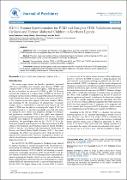| dc.contributor.author | Dokkedahl, Sarah | |
| dc.contributor.author | Oboke, Henry | |
| dc.contributor.author | Ovuga, Emilio | |
| dc.contributor.author | Elklit, Ask | |
| dc.date.accessioned | 2019-09-13T09:54:07Z | |
| dc.date.available | 2019-09-13T09:54:07Z | |
| dc.date.issued | 2015 | |
| dc.identifier.citation | Dokkedahl, S., Oboke, H., Ovuga, E., & Elklit, A. (2015). ICD-11 trauma questionnaires for PTSD and complex PTSD: Validation among civilians and former abducted children in Northern Uganda. Journal of Psychiatry, 18(2). | en_US |
| dc.identifier.uri | https://hdl.handle.net/123456789/66 | |
| dc.description.abstract | Abstract
Objectives: ICD-11 is expected to introduce a new diagnosis of C-PTSD, along with a revision of the current
PTSD diagnosis. Are the suggested diagnostic tools for PTSD and C-PTSD valid in a developing country?
Method: The tools have been tested on former abducted and regular civilians in northern Uganda (n=314), who
have been influenced by the civil war that lasted for more than two decades.
Results: The prevalence of either PTSD or C-PTSD was 36.6% and PTSD and C-PTSD was further found to
correlate with symptoms of depression, anxiety and somatic complaints.
Conclusion: Based on its findings the study concludes that the ICD-11 tools for PTSD and C-PTSD both appear
to be valid as suggested by both discriminant and convergent validation of the tools. However, future research can
benefit from studying cultural aspects of these diagnoses. | en_US |
| dc.language.iso | en | en_US |
| dc.publisher | Journal of Psychiatry | en_US |
| dc.subject | Trauma | en_US |
| dc.subject | Abduction | en_US |
| dc.subject | Children | en_US |
| dc.subject | Northern Uganda | en_US |
| dc.title | ICD-11 Trauma Questionnaires for PTSD and Complex PTSD: Validation among Civilians and Former Abducted Children in Northern Uganda | en_US |
| dc.type | Article | en_US |

